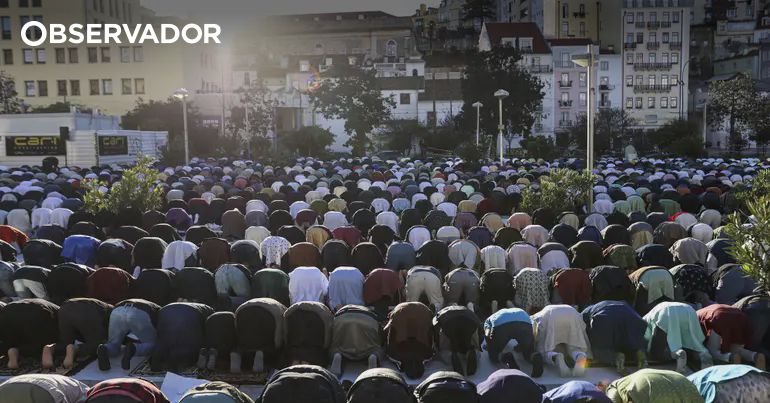Summary:
5,000 Muslims gathered in Lisbon's Alameda to celebrate Eid al-Fitr.
The event featured prayers, hymns, and communal fellowship.
Participants included families and individuals, all dressed in traditional attire.
Charity donations were collected during the event, emphasizing the importance of charity in Ramadan celebrations.
The Muslim community in Portugal has grown to over 100,000 believers.
Celebration of Eid al-Fitr in Lisbon
Around 5,000 Muslims dressed in traditional attire gathered this morning in Alameda, Lisbon, to celebrate the end of Ramadan. This sacred moment was marked by hymns, prayers, fellowship, and countless photographs.
Eid al-Fitr, the celebration marking the end of the Islamic holy month, begins with a communal prayer held in mosques or open spaces, bringing together the entire community. In Lisbon, where approximately 15,000 Muslims reside, prayers were scheduled for both Martim Moniz Square and Alameda, alongside the usual gatherings at the Central Mosque.
At 07:00, as dawn broke, a few dozen individuals were seen moving against the light on the central lawn of Dom Afonso Henriques Garden, laying down large waterproof tarps that would serve as the ground for the upcoming prayers. A flock of seagulls flew over this gathering, highlighting the contrast against the yellowish light of the fountain, as another group of Muslims began to set up a new tarp, signaling the arrival of thousands in less than half an hour.
Families, groups, and individuals arrived on foot, by car, and bicycle, carrying their own prayer rugs, showcasing the joy and warmth with which they greeted each other. A small pulpit adorned with plants and flowers was set up at the top of the lawn, from where the imam led the prayers for the thousands seated on their rugs, creating a large, colorful mosaic of diverse patterns.
Thousands of shoes framed the rectangle of grass where the Muslims sat, perfectly aligned, listening to the prayers amplified by two large speakers on either side of the Alameda. The gathering was predominantly made up of men, but also included women and children, all dressed in specific garments for the occasion: long tunics and kufi hats for men, and colorful long capes with shiny appliqués or mirrors along with hijabs for women.
By 08:30, as the prayer concluded, people began to rise, rolling up their rugs and putting on their shoes, gathering in animated groups to chat, take group photos, and many selfies. It was also the time to collect the various buckets that had circulated among the faithful to gather donations for those in need, as charity plays a central role in the celebrations marking the end of Ramadan.
“The Eid al-Fitr prayer has just ended. It is the Islamic celebration of our Muslim community. We come together to celebrate. Today, I pray to Allah for everyone to be happy,” stated Akiful Hasam, a young Muslim leaning against one of the walls near the metro entrance, with his rolled-up rug tucked away in a plastic bag. For Akiful, who has lived in Portugal for several years, this is a “good country for Islam”, where he feels no obstacles to his religious freedom and celebration, although he acknowledges that existing spaces are already limited for the resident population.
The same sentiment is echoed by Mohammed Chowdhury, president of the Alameda Jame Masjid, who noted that the Muslim community is growing, bringing together faithful from various parts of the world residing in Portugal, from Bangladesh to India, through Pakistan and Morocco, among many other countries. He estimates that about 5,000 believers attended today’s celebration in Alameda.
“On Friday, the Jumu’ah prayer had to be held three times [at the Alameda mosque] to accommodate everyone because there are more and more people,” he told Lusa, suggesting that if there were more mosques, it would be easier.
The Salat al-Jumu’ah is a special prayer held on Fridays and is one of the most important of the week for Muslims, signifying the end of Ramadan, a moment of reflection, gratitude, and spiritual renewal for the Islamic community.
“The last day of Ramadan is marked by the sighting of the new moon, signaling the start of a new lunar month, according to the Islamic calendar. On this last day, we all celebrate together worldwide, rich, poor, refugees, in war, in any situation, this is a significant festive moment,” he emphasized.
By 09:30, near the Central Mosque of Lisbon, the hub of the Portuguese Islamic community in São Sebastião, a crowd—marked by the richness and exuberance of clothing, especially the women’s attire, makeup, and fragrance in the air—gathered at the doors to enter. Inside, staff guided the way and arranged seating to accommodate as many people as possible. Outside, municipal police directed traffic and parking amidst the chaos of a Sunday morning.
According to Abdul Razac Seco, vice president of the Islamic Community of Lisbon, the group aimed to attend the second prayer, specifically held for those unable to be present for the first prayer led by Sheikh David Munir at 07:30. “Some choose to come now, but many can only attend this prayer due to logistical issues, meaning the space cannot accommodate everyone,” he specified, adding that afterwards everyone would return home to share meals and conclude the celebrations.
During Ramadan, the Central Mosque of Lisbon prepared around 2,000 meals daily for breaking the fast at sunset. The lunar year being shorter than the solar year explains why Ramadan dates advance by 10 to 11 days each year. In 2030, Ramadan will be celebrated twice, in early January and late December.
According to Sheikh David Munir, the Muslim community in Portugal has “surpassed 100,000” believers.










Comments
Join Our Community
Create an account to share your thoughts, engage with others, and be part of our growing community.